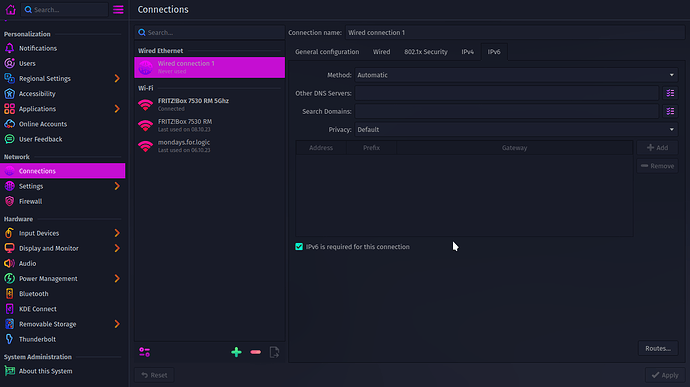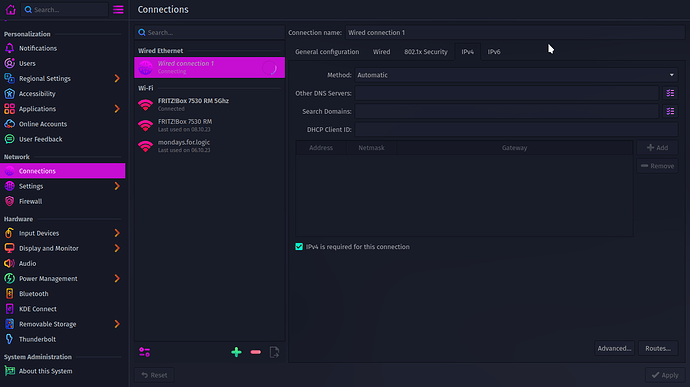I am getting an issue again, that plagued me a while ago. I always managed to temporarily fix it, and I want to track it down this time.
The Network Manager tries to connect me to an Ethernet connection, while this installation has never seen one at all, and particularly not at the time.
It fails to connect and tries again.
I added the journalctl since the boot, it started immediately after that one.journalctl -r -b
FGD
13 October 2023 13:34
2
Well that’s kinda annoying!
Are you able to remove the Ethernet/Wired connection from System Settings ?Network , not on my machine right now.
1 Like
FGD
13 October 2023 14:57
4
Ha I see, it even decides to appear/disappear by itself in System Settings!
I’m not good enough with networking to go deeper on this one. KDE.org ?
1 Like
I didnt found any.
The Network Manager is although not a KDE tool, it is its own thing.
The search terms loop, connect and auto-connect didn’t yield anything either.
I don’t know, if Network Manager is to blame, even.
FGD
13 October 2023 15:33
6
Are you able to reproduce with a different installation, or from an ISO?
1 Like
Yes, I experienced this issue with Garuda last year, and now again on this ISO from October.
FGD
13 October 2023 15:36
8
Sorry, I meant a Live ISO, does it also happen?
1 Like
The issue occurs relatively unpredictably. I had months where no boot caused this, so I think it is relatively tricky to reproduce this live.
Are you concerned with the customizations that I did to the system, or the different image that the live mode boots?
FGD
13 October 2023 16:36
10
Not really concerned about those, I don’t have enough knowledge about networking apps/services to make any possible link.
1 Like
could you share journalctl -u NetworkManager after telling the system to connect?
3 Likes
tbg
13 October 2023 19:15
12
This could be some type of bug with Network Manager or any other networking component. Sometimes testing an alternate to network manager may help troubleshoot the problem.
The best GUI alternative to network manager is to test out Connman & cmst. I have not used Connman in a very long time, but I have found it an adequate replacement for Network Manager in the past. Although, I will say Connman is very different to Network Manager and it does take a fair bit of getting used to.
https://wiki.archlinux.org/title/ConnMan
3 Likes
I don’t know what you mean with “after telling the system to connect”
It connects constantly, and journalctl is supposed to show all the past attempts, I assume?
The wlan works just as expected, and I don’t have any issues with that whatsoever.Paste.ee - Network Manager
tbg:
This could be some type of bug with Network Manager or any other networking component. Sometimes testing an alternate to network manager may help troubleshoot the problem.
The best GUI alternative to network manager is to test out Connman & cmst. I have not used Connman in a very long time, but I have found it an adequate replacement for Network Manager in the past. Although, I will say Connman is very different to Network Manager and it does take a fair bit of getting used to.
ConnMan - ArchWiki
That is a very good idea, but again, it may take months to trigger this issue again.
Or, worse, I wait for months, nothing happens and it could still be both, Network Manager or something else.
So I guess just filling a report for Network Manager and working through it with the guys, would make more sense.
Or, that might actually be sensible, changing the DE.
I could strip myself from Plasma at the running instance, and see if it tries to reconnect again.
To some WM?
1 Like
tbg
14 October 2023 08:57
14
I can’t see any smoking gun in your logs, but without your garuda-inxi output it somewhat limits further suggestions.
A few universal suggestions:
Make sure your bios is up to date.
Power down your computer, then remove all AC & DC power sources. Leave the computer without power for several minutes then restart.
Try a different session, switch to X11 if using Wayland and vice versa.
Switch to iwd if using wpa_supplicant and vice versa.
1 Like
Will do so.
This happens regularly. The battery is already pretty dry, and discharges quickly. Then, the computer is without a power source for long.
Happens on both.
Will look into this.
Please, post garuda-inxi here in this post
garuda-inxi
System:
Kernel: 6.5.7-zen1-1-zen arch: x86_64 bits: 64 compiler: gcc v: 13.2.1
clocksource: tsc available: acpi_pm
parameters: BOOT_IMAGE=/@/boot/vmlinuz-linux-zen
root=UUID=4836c503-d2d0-481e-a632-f9ac2f82aebc rw rootflags=subvol=@
quiet loglevel=3 ibt=off
Desktop: KDE Plasma v: 5.27.8 tk: Qt v: 5.15.11 wm: kwin_wayland vt: 1
dm: SDDM Distro: Garuda Linux base: Arch Linux
Machine:
Type: Laptop System: HP product: HP EliteBook 820 G3 v: N/A
serial: <superuser required> Chassis: type: 10 serial: <superuser required>
Mobo: HP model: 807C v: KBC Version 85.61 serial: <superuser required>
UEFI: HP v: N75 Ver. 01.05 date: 03/22/2016
Battery:
ID-1: BAT0 charge: 36.0 Wh (100.0%) condition: 36.0/36.0 Wh (100.0%)
volts: 12.8 min: 11.4 model: Hewlett-Packard Primary type: Li-ion
serial: <filter> status: full
CPU:
Info: model: Intel Core i5-6200U bits: 64 type: MT MCP arch: Skylake
gen: core 6 level: v3 note: check built: 2015 process: Intel 14nm family: 6
model-id: 0x4E (78) stepping: 3 microcode: 0xF0
Topology: cpus: 1x cores: 2 tpc: 2 threads: 4 smt: enabled cache:
L1: 128 KiB desc: d-2x32 KiB; i-2x32 KiB L2: 512 KiB desc: 2x256 KiB
L3: 3 MiB desc: 1x3 MiB
Speed (MHz): avg: 500 min/max: 400/2800 scaling: driver: intel_pstate
governor: powersave cores: 1: 500 2: 500 3: 500 4: 500 bogomips: 19200
Flags: avx avx2 ht lm nx pae sse sse2 sse3 sse4_1 sse4_2 ssse3 vmx
Vulnerabilities: <filter>
Graphics:
Device-1: Intel Skylake GT2 [HD Graphics 520] vendor: Hewlett-Packard
driver: i915 v: kernel arch: Gen-9 process: Intel 14n built: 2015-16 ports:
active: eDP-1 empty: DP-1, DP-2, HDMI-A-1, HDMI-A-2 bus-ID: 00:02.0
chip-ID: 8086:1916 class-ID: 0300
Device-2: Cheng Uei Precision Industry (Foxlink) HP HD Camera
driver: uvcvideo type: USB rev: 2.0 speed: 480 Mb/s lanes: 1 mode: 2.0
bus-ID: 1-9:4 chip-ID: 05c8:0383 class-ID: 0e02
Display: wayland server: X.org v: 1.21.1.8 with: Xwayland v: 23.2.1
compositor: kwin_wayland driver: X: loaded: modesetting
alternate: fbdev,intel,vesa dri: iris gpu: i915 display-ID: 0
Monitor-1: eDP-1 res: 1366x768 size: N/A modes: N/A
API: EGL v: 1.5 hw: drv: intel iris platforms: device: 0 drv: iris
device: 1 drv: swrast surfaceless: drv: iris wayland: drv: iris x11:
drv: iris inactive: gbm
API: OpenGL v: 4.6 compat-v: 4.5 vendor: intel mesa v: 23.2.1-arch1.2
glx-v: 1.4 direct-render: yes renderer: Mesa Intel HD Graphics 520 (SKL GT2)
device-ID: 8086:1916 memory: 7.25 GiB unified: yes display-ID: :1.0
API: Vulkan v: 1.3.264 layers: 3 device: 0 type: integrated-gpu name: Intel
HD Graphics 520 (SKL GT2) driver: mesa intel v: 23.2.1-arch1.2
device-ID: 8086:1916 surfaces: xcb,xlib,wayland device: 1 type: cpu
name: llvmpipe (LLVM 16.0.6 256 bits) driver: mesa llvmpipe
v: 23.2.1-arch1.2 (LLVM 16.0.6) device-ID: 10005:0000
surfaces: xcb,xlib,wayland
Audio:
Device-1: Intel Sunrise Point-LP HD Audio vendor: Hewlett-Packard
driver: snd_hda_intel v: kernel alternate: snd_soc_skl,snd_soc_avs
bus-ID: 00:1f.3 chip-ID: 8086:9d70 class-ID: 0403
API: ALSA v: k6.5.7-zen1-1-zen status: kernel-api tools: N/A
Server-1: PipeWire v: 0.3.81 status: active with: 1: pipewire-pulse
status: active 2: wireplumber status: active 3: pipewire-alsa type: plugin
4: pw-jack type: plugin tools: pactl,pw-cat,pw-cli,wpctl
Network:
Device-1: Intel Ethernet I219-V vendor: Hewlett-Packard driver: e1000e
v: kernel port: N/A bus-ID: 00:1f.6 chip-ID: 8086:1570 class-ID: 0200
IF: enp0s31f6 state: down mac: <filter>
Device-2: Intel Wireless 8260 driver: iwlwifi v: kernel pcie: gen: 1
speed: 2.5 GT/s lanes: 1 bus-ID: 02:00.0 chip-ID: 8086:24f3 class-ID: 0280
IF: wlp2s0 state: up mac: <filter>
Device-3: HP HP lt4120 Snapdragon X5 LTE driver: cdc_ether type: USB
rev: 2.0 speed: 480 Mb/s lanes: 1 mode: 2.0 bus-ID: 1-3:7 chip-ID: 03f0:9d1d
class-ID: 0a00 serial: <filter>
IF: enp0s20f0u3i1 state: up speed: 425 Mbps duplex: half mac: <filter>
Bluetooth:
Device-1: Intel Bluetooth wireless interface driver: btusb v: 0.8 type: USB
rev: 2.0 speed: 12 Mb/s lanes: 1 mode: 1.1 bus-ID: 1-7:2 chip-ID: 8087:0a2b
class-ID: e001
Report: btmgmt ID: hci0 rfk-id: 0 state: down bt-service: enabled,running
rfk-block: hardware: no software: yes address: <filter> bt-v: 4.2 lmp-v: 8
status: discoverable: no pairing: no
Drives:
Local Storage: total: 894.26 GiB used: 22.2 GiB (2.5%)
SMART Message: Unable to run smartctl. Root privileges required.
ID-1: /dev/nvme0n1 maj-min: 259:0 vendor: Patriot model: M.2 P310 480GB
size: 447.13 GiB block-size: physical: 512 B logical: 512 B speed: 31.6 Gb/s
lanes: 4 tech: SSD serial: <filter> fw-rev: EDFM90.0 temp: 29.9 C
scheme: GPT
ID-2: /dev/sda maj-min: 8:0 vendor: Kingston model: SA400S37480G
size: 447.13 GiB block-size: physical: 512 B logical: 512 B speed: 6.0 Gb/s
tech: SSD serial: <filter> fw-rev: 1103 scheme: GPT
Partition:
ID-1: / raw-size: 446.83 GiB size: 446.83 GiB (100.00%)
used: 22.19 GiB (5.0%) fs: btrfs dev: /dev/sda2 maj-min: 8:2
ID-2: /boot/efi raw-size: 300 MiB size: 299.4 MiB (99.80%)
used: 576 KiB (0.2%) fs: vfat dev: /dev/sda1 maj-min: 8:1
ID-3: /home raw-size: 446.83 GiB size: 446.83 GiB (100.00%)
used: 22.19 GiB (5.0%) fs: btrfs dev: /dev/sda2 maj-min: 8:2
ID-4: /var/log raw-size: 446.83 GiB size: 446.83 GiB (100.00%)
used: 22.19 GiB (5.0%) fs: btrfs dev: /dev/sda2 maj-min: 8:2
ID-5: /var/tmp raw-size: 446.83 GiB size: 446.83 GiB (100.00%)
used: 22.19 GiB (5.0%) fs: btrfs dev: /dev/sda2 maj-min: 8:2
Swap:
Kernel: swappiness: 133 (default 60) cache-pressure: 100 (default) zswap: no
ID-1: swap-1 type: zram size: 7.42 GiB used: 3.97 GiB (53.5%)
priority: 100 comp: zstd avail: lzo,lzo-rle,lz4,lz4hc,842 max-streams: 4
dev: /dev/zram0
Sensors:
System Temperatures: cpu: 64.0 C pch: 53.0 C mobo: N/A
Fan Speeds (rpm): N/A
Info:
Processes: 239 Uptime: 15h 43m wakeups: 5 Memory: total: 8 GiB note: est.
available: 7.42 GiB used: 5.43 GiB (73.1%) Init: systemd v: 254
default: graphical tool: systemctl Compilers: gcc: 13.2.1 Packages:
pm: pacman pkgs: 1490 libs: 377 tools: octopi,paru Shell: fish v: 3.6.1
running-in: yakuake inxi: 3.3.30
Garuda (2.6.17-1):
System install date: 2023-10-05
Last full system update: 2023-10-13 ↻
Is partially upgraded: No
Relevant software: snapper NetworkManager dracut
Windows dual boot: No/Undetected
Failed units:
Happy weekend, SGS
from what I found online, maybe your dhcp client is having some issues.here and then upload the service’s log
1 Like
wpa_supplicant or iwd are about wireless connections.
1 Like
I use the default solution, so the inbuild Network Manager stuff.
I am able to set the setting “ipv4 is required for this connection” and it even lasts beyond the loop iterations.
Same thing for ipv6. Doing so does not change anything, and assuming this setting is applying, can we outrule, that it is either the ipv4 or ipv6 implementation, right?
I can try to swap the whole network stack, but again, then is the issue most likely gone anyway, if it is actually being fixed, or simply not yet triggered again.
Connman looks really good, I would love to try this one eventually.
1 Like
Well then your overall best option seems to be to crank up the loglevel:/etc/NetworkManager/conf.d/95-loglevel.conf and add
[logging]
level=TRACE
domains=ALL
Then restart NetworkManager, and upload the connection attempt logs again
2 Likes
I created that file, and then restarted the NetworkManager via systemctl restart NetworkManager and got this as the logs:
And no connections are possible anymore AT ALL.
Also Wifi doesn’t connect anymore.
Setting the log level back to normal and restarting NetworkManager again
This new error popup appears:
I had to restart the whole system.
So, the opportunity to track the issue down, is gone for now as well.
1 Like



